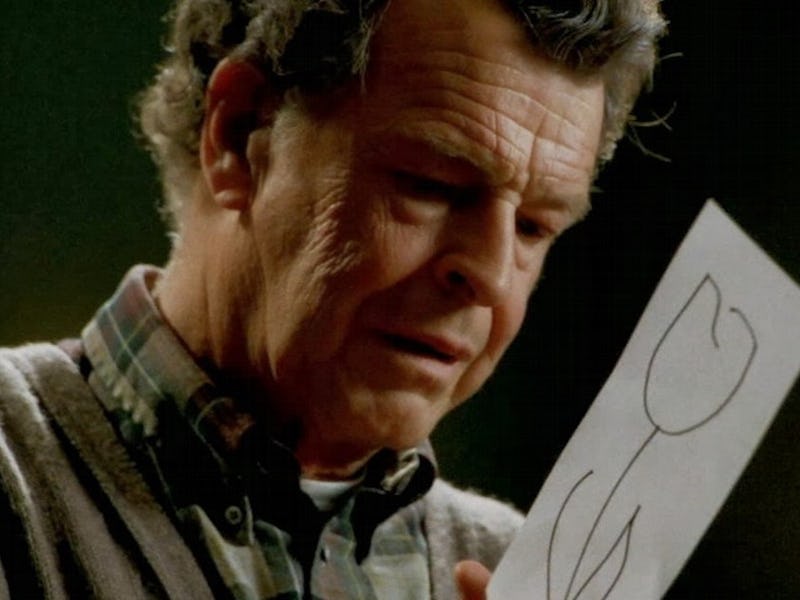Fringe’s Finest Hour Is Sci-Fi’s Most Profound Exploration of Faith and Science
“I’ve asked God for a sign of forgiveness. A specific one, a white tulip.”

Time travel is the be-all-end-all of science fiction episodes. What makes stories about time travel so fascinating is the fantasy of tomorrow, the obsession with the past, and all of the what-ifs with which those two are associated. To be able to travel to a different time is to hold an unimaginable power because the one thing that can never be beaten is time. For its ability to explore time travel in all its tragic forms, “White Tulip” is arguably the best episode of Fringe.
Airing just two weeks after the flashback episode “Peter,” “White Tulip” gives Walter (John Noble) a doomed peer in the form of Peter Weller’s Alistair Peck, a scientist attempting to travel in time to save his fiancée from a car accident. Through its time-travel narrative, “White Tulip” explores the concepts of God, science, and forgiveness — coming to a conclusion about faith that transcends all of Fringe’s sci-fi TV counterparts.
The episode begins with a flash. A man appears on a train and in his wake, he leaves behind a lot of dead bodies. This is how we meet Alistair Peck. Once Peter (Joshua Jackson), Olivia (Anna Torv), and Walter are on the case, the investigation moves fairly quickly. We’re barely through a quarter of the episode before the team has found their way to Peck’s apartment. But Peck has arrived as well, and as he confronts the FBI agents in the lobby of his building, he starts disappearing. Another flash. We’re back on the train with Peck. And the episode plays out similarly — except the team is experiencing some weird déjà vu. Eventually, the team works out that Peck has figured out how to travel back in time by fusing a Faraday machine into his body (resulting in some gnarly practical effects, a great nod to how going to such lengths can physically destroy you too) and is trying to get as far back as 10 months in order to save his fiancée. Once his motives are clear, so too is the episode’s entire point.
The episode’s climactic moment boils down to a conversation. At Peck’s lab at MIT, Walter and Alistair (Noble and Weller giving dueling heartbreaking performances) sit down across from each other, recognizing the same madness and grief within the other. Walter tells Peck the right calculations to make it 10 months in the past, but in the same breath, pleads with Peck not to attempt the jump.
Just as the worldly consequences followed Walter’s universe-hopping, there’s no telling what consequences may come from Peck saving his fiancée. Though Walter has struggled to find the right words for Peter, here he comes clean to Peck, a person who understands going to extreme lengths for the people they love.
It’s important to note in this conversation two things: 1) in the years following Walter’s universe hopping, he’s come to understand that God is punishing him — a far cry from declaring himself God in 1985, and 2) that he’s waiting to tell Peter because he’s looking for a sign of forgiveness from God. Specifically, a white tulip. Peck points out that tulips of any kind do not grow this time of year. When time runs out and the FBI agents swarm the lab, Peck jumps again, inputting Walter’s calculations. But instead of trying to save his fiancée, he gets in the car, tells her, “I love you,” and dies with her.
Peter Weller’s Alistair Peck was the doomed foil to John Noble’s Walter Bishop.
It’s wild to think that Fringe’s best episode technically doesn’t happen. Because of Peck’s final jump, the entire case on the train is wiped clean. We’re back at the beginning with Walter, trying to explain everything to Peter in a letter. Without the case interrupting him, Walter decides to toss the letter into the fire. But in the episode’s final shot, Walter receives a letter from Peck that he wrote before his final jump.
The audience may know the hand-drawn white tulip came from Peck, but Walter doesn’t. To him, it’s the sign he was looking for, but it didn’t come in the manner he was expecting. Peck initially wanted to jump to save his fiancée: instead, he got one more moment to love her. Forgiveness comes in unexpected ways; hope does too. We end on Walter’s surprise. We don’t know what he’s going to do next, but by granting him that white tulip of forgiveness, Peck gave Walter the hope to move forward. After all, there’s only so much time we get. A single moment can make all the difference.